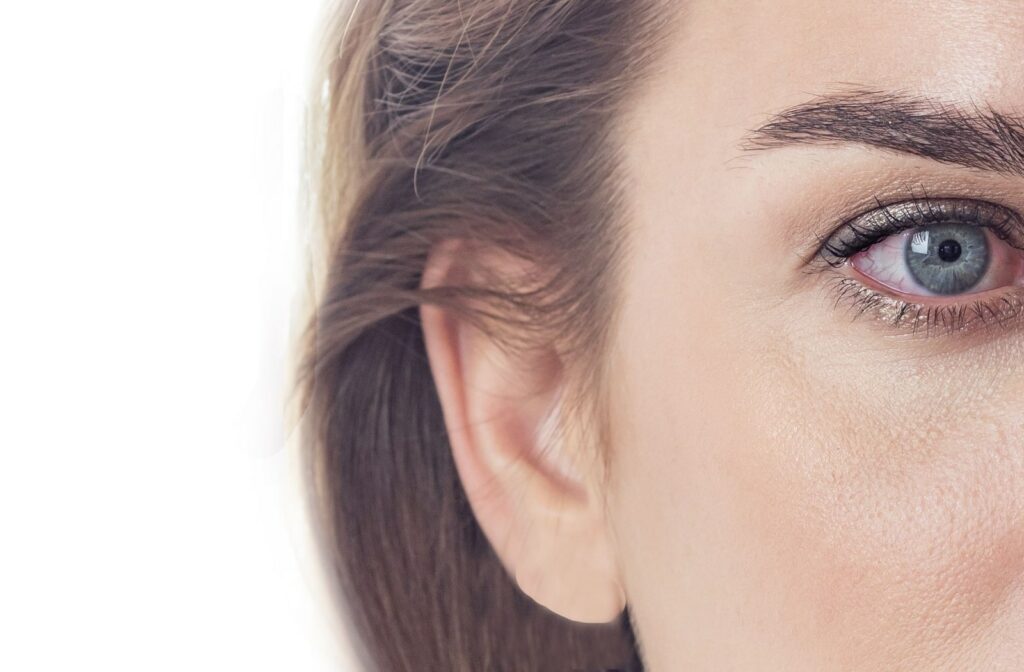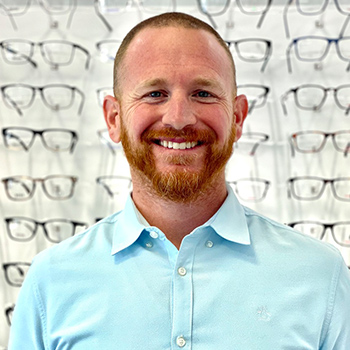Is it possible your body’s stash of vitamins has fallen short, causing uncomfortable, dry eyes? A question that resonates with optometry patients and vitamin enthusiasts alike: Can a lack of vitamins lead to the pesky affliction?
Intriguingly, the correlation between vitamin levels and ocular health is not just a matter of pill-popping supplements. There’s an intricate dance of nutrition and biological ballet happening inside, potentially dictating whether our eyes glisten or feel as arid as the Sahara. Your optometrist can help determine the most likely culprit of vitamin deficiency leading to your dry eye, and an eye exam is the first step to restoring hydration.
Understanding Dry Eye
Your eyes rely on a constant supply of tears to stay happy and hydrated, but when they fall short, you get stuck with that scratchy, stinging feeling that makes you want to rub your eyes all day.
Common symptoms of dry eye include:
- Burning sensation
- Grittiness
- Stinging feeling
- Sensitivity to light
- Blurry vision
- Overwatering of the eyes
Not all dry eye is the same. Aqueous deficient dry eye is characterized by an underproduction of tears, while evaporative dry eye occurs when the eyes produce poor-quality tears. Some causes of dry eye include:
- Age
- Meibomian gland dysfunction
- Diseases like rheumatoid arthritis, Sjogren’s syndrome, lupus, thyroid disorders
- Blepharitis
- Smoky, windy, or dry climate
- Digital eye strain
- Contact lens wear
- Hormonal changes
- Medications like antidepressants, antihistamines, beta-blockers, or heartburn medication
Understanding Vitamins & Their Role in Dry Eye
The backstage of ocular nutrition includes a roster of vitamins:
- Vitamin A
- Vitamin C
- Vitamin D
- Vitamin E
- B-complex vitamins
Their primary function is to bolster the protective layers of the eye, enhance tear production, and curb inflammation. A deficiency in these nutrients tilts the odds in dry eye’s favor.
Vitamin A, long lauded for its night-vision prowess, extends its talents to maintain the health of the cornea, the eye’s outermost layer. Meanwhile, vitamin C is the unsung hero that keeps the collagen in conjunctival tissues strong, and Vitamin E is an atmospheric shield, fighting the oxidants that cause cellular damage.
Vitamins & Dry Eye
If we consider dry eye as a collective of symptoms—the scratchy sensation, redness, and excessive tearing that rarely relieves—then it is imperative to ask whether vitamins can play a role. Research indicates that a lack of specific vitamins, notably A, C, D, and E, can increase the prevalence of dry eye symptoms.
Common Vitamin Deficiencies
The culprits behind the depletion of our ocular vitamins are often dietary. Foods rich in these vitamins are a deliberate choice to armor your eyes against dry eye.
- Vitamin A, sourced from sweet potatoes and spinach, is crucial for vision health.
- Loaded with Vitamin C, oranges and bell peppers maintain the eye’s connective tissues.
- Vitamin E can be courted from nuts and sunflower seeds, offering an oil-slick defense against dry eye.
- Vitamin D is commonly known as the sun’s vitamin, but fortified foods can help you achieve your daily intake.
However, despite the accessibility of these approaches to alleviate the ocular drought, the diets of millions often fall short.
Prevention & Treatment
How do you infuse your lifestyle with the vitamins you lack?
- Regular exposure to a rainbow spectrum of fruits and vegetables provides the orchestra of vitamins our eyes yearn for—kaleidoscopic salads, vibrant fruit platters, and the satisfying crunch of nuts that doubles as a Vitamin E charge.
- Supplements are a substitute when your diet falls short. However, the disparity lies in the bioavailability, and supplements have different absorption rates that may be less effective.
- Regular eye examinations detect early signs of deficiency or dryness and can help you make supplements or dietary corrections.
Vitamin Supplements for Dry Eye
Certain vitamin deficiencies are more to blame for dry eyes than others.
- Vitamin A: This vitamin is essential to eye health and affects healthy tear production. Any deficiency can wreak havoc on your ocular system, including contributing to dry eye.
- Vitamin D: When the eye’s surface is inflamed, it could be caused by a vitamin D deficiency. Supplements can help improve tear quality and help fight off the winter blues.
- Omega-3: Fatty acids found in omega-3 are a natural anti-inflammatory and support the oil production of your tears.
Supplements are produced at varying degrees of quality, so talk to your optometrist for high-grade recommendations.
Other Treatments for Dry Eye
Dealing with dry eye is distracting, so more immediate solutions are needed in balance with increased nutrition.
- Lipiflow: In-office treatment using gentle massage and heat.
- Punctal Plugs: Tear duct plugs to prevent tear drainage.
- Eyelash and Eyelid Cleansers: Ideal for blepharitis-related dry eye.
- Heat Masks: At-home treatment for short-term relief.
Defeat Dry Eye with Nutrients
Dietary choices impact every blink of your eyes. A plate stacked high with vitamins, supplements, and regular visits to Dr. Bittel Optometry in Yorba Linda can help naturally restore your tear balance. Schedule an appointment for an eye exam and dry eye assessment to relieve the symptoms disrupting your daily life.
With the proper nutrient recommendations from your optometrist, you’ll get a personalized picture of your eye health to properly support your ocular nutrition.


